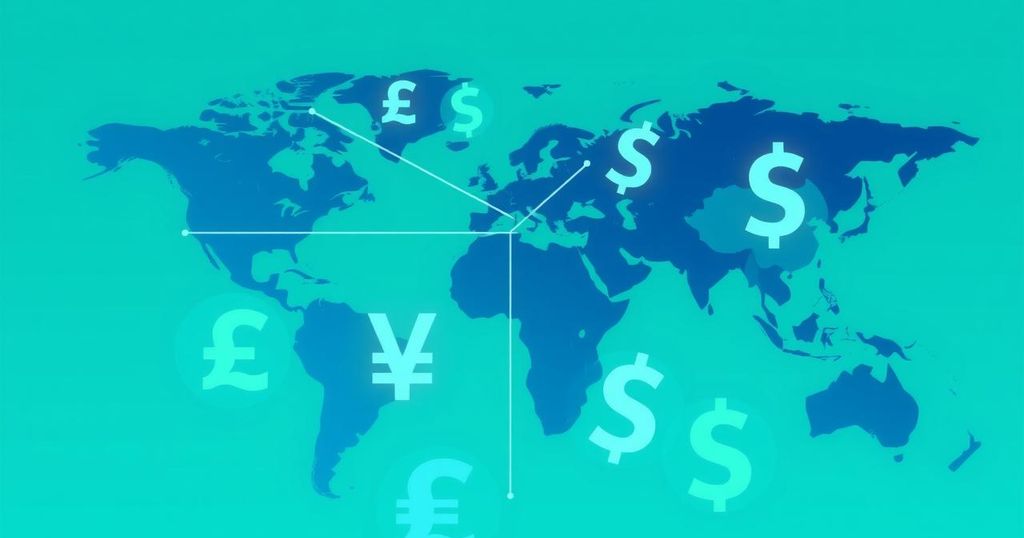In 2024, Nigeria’s debt servicing to the World Bank and IMF rose to $2.32 billion, a sharp increase from $998.92 million in 2023. Payments to multilateral creditors accounted for 56% of total external debt servicing. The country’s ongoing reliance on these institutions underscores a significant fiscal burden amidst economic pressures, prompting a government shift toward equity investments.
In 2024, Nigeria incurred $2.32 billion to service its debts owed to the World Bank and International Monetary Fund (IMF), a substantial rise from $998.92 million in 2023, as reported by the Debt Management Office. The analysis revealed Nigeria made payments of $689.44 million to the World Bank, which included $663.23 million to the International Development Association (IDA) and $26.21 million to the International Bank for Reconstruction and Development (IBRD). Additionally, servicing the IMF debt reached approximately $1.63 billion during the same period, composed entirely of principal repayments.
Comparatively, the country had disbursed $597.19 million to the World Bank and $401.73 million to the IMF in the previous year. Consequently, there was an increase of over 134 percent in total payments made to these two institutions, primarily driven by the repayments to the IMF. Overall, Nigeria’s external debt servicing totalled $4.66 billion in 2024, an increase from $3.5 billion in 2023, with multilateral creditors receiving the largest share of $2.62 billion, making up 56 percent of the total.
The IMF alone represented 35 percent of Nigeria’s overall external debt servicing for 2024 and approximately 62 percent of the amounts paid to multilateral lenders. On the other hand, commercial creditors received $1.47 billion, reflecting a decrease from $1.93 billion in 2023, while bilateral creditors were compensated with $570.67 million, an increase from $344.57 million. Despite the decline in payments to commercial lenders, the substantial rise in repayments to multilateral institutions, particularly the IMF, was notable.
The World Bank’s IDA, committed to providing concessional financing to developing nations, continues to be Nigeria’s largest multilateral creditor, receiving over $663 million in 2024. This amount consisted of $414.86 million in principal repayments and $248.10 million in interest. Additionally, payments to the IBRD experienced a slight rise, attributed to increasing interest charges.
The combined payments to the IMF and the World Bank constituted nearly 49.8 percent of Nigeria’s total external debt servicing in 2024, compared to 27.8 percent in 2023, indicating a growing dependence on multilateral support. This trend raises concerns about the increasing strain on Nigeria’s fiscal space amid fragile revenue mobilization and ongoing pressures on the naira.
Nigeria’s debt burden to the World Bank increased by $2.36 billion in 2024, while obligations to the IMF decreased by $1.67 billion due to new disbursements from development institutions alongside repayments. By December 31, 2024, Nigeria’s total external debt stock reached $45.78 billion, up from $42.50 billion the previous year, primarily influenced by additional borrowings from the World Bank Group.
The composition of Nigeria’s debt portfolio reveals that the loans from the World Bank represented 79.8 percent of total multilateral debt in 2024, increasing from 73.1 percent in 2023. Conversely, the IMF’s share declined from 11.7 percent in 2023 to a mere 3.6 percent in 2024, indicating a significant shift in the structure of Nigeria’s multilateral borrowing.
Minister of Finance and Coordinating Minister of the Economy, Wale Edun, addressed the matters regarding governmental borrowing strategies at a recent Corporate Governance Forum. He emphasized a strategic shift away from mere debt financing towards equity generation and revenue enhancement, showcasing Nigeria’s gradual transition from various loan types to more equity investments and public-private partnerships.
In summary, Nigeria’s debt servicing requirements to the World Bank and IMF surged significantly in 2024, reflecting the country’s heightened reliance on multilateral loans. The external debt servicing totals reached $4.66 billion, underscoring the increasing financial burden as Nigeria navigates fiscal challenges and pursues development financing. Minister Wale Edun’s remarks regarding a strategic pivot towards equity investments indicate potential long-term changes in Nigeria’s financial strategy, although the nation continues to rely heavily on external borrowing to support its initiatives.
Original Source: punchng.com




